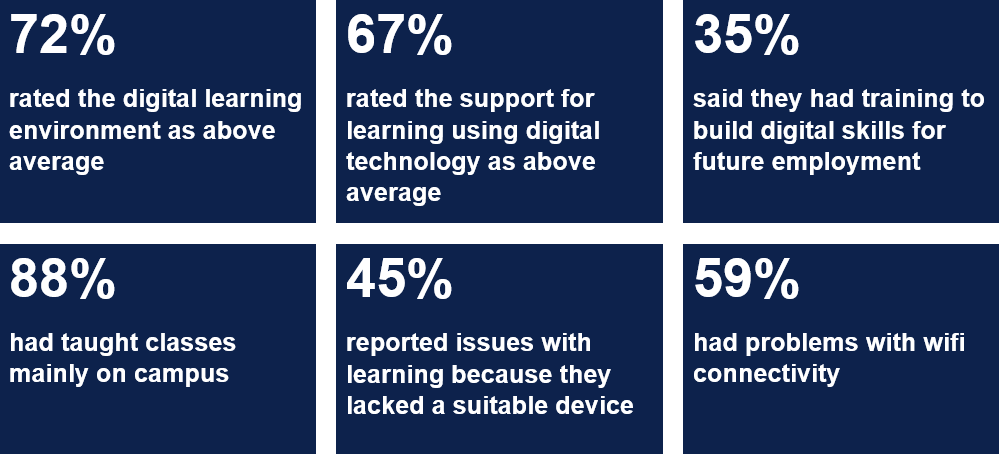2024/25 UK further education learners digital experience insights survey findings
The digital experience insights survey for further education learners took place between October 2024 and April 2025. Participating FE colleges and sixth form colleges were able to select their own survey period within these dates, typically a three to four week window.
There were 5,881 respondents from 16 organisations. 15 of these were based in England and one in Scotland. These 16 organisations represent 6% of all further education providers in the UK. A separate analysis of the digital experience of learners in colleges in Wales was conducted in 2024/25.
The highest number of responses from a single organisation was 1,047 learners. The mean number of responses was 368 per organisation and the median number of responses was 372 per organisation. However, six of the 16 organisations contributed fewer than 100 responses.
A survey indicating the digital experience of higher education students is run simultaneously and results can be found on our 2024/25 HE students report.
Through Jisc’s digital experience insights service, organisations can gain valuable data to inform strategic, operational and digital investment decisions, evidence year-on-year improvements and demonstrate return on investment. Organisations that take part have access to their own data to assess their unique situations as well as benchmarking data. Full information about the digital experience insights surveys is detailed on our information page.
Executive summary

The 2024/25 digital experience insights survey for learners in further education provides a detailed view of how digital technologies are shaping the digital learning landscape across colleges in the UK. Drawing on responses from a diverse learner population, the survey explored access to devices, learners’ experience of digital infrastructure, the quality of digital learning environments, support for digital skills, and the impact of cost of living pressures on learners’ ability to engage with digital education.
This year’s findings show a generally stable picture in terms of learner satisfaction with digital learning. Just under three-quarters (72%) of learners rated both the digital learning environment and the quality of digital learning on their course as above average, broadly consistent with last year’s results. Learners continued to value the flexibility, convenience, and efficiency that digital technologies afford, particularly in enabling self-paced and remote learning, supporting collaboration, and providing access to a wide range of course and wider learning resources.
However, the survey also highlights persistent and, in some cases, worsening challenges. Nearly half of learners (45%) reported not having a suitable device for learning. Connectivity issues remained widespread, with 59% of learners experiencing wifi problems, with the issue being particularly prevalent on campus (48%). Cost of living pressures continued to have a potential impact on some learners’ ability to study and engage through digital technologies. About a fifth (19%) of learners took on paid work that may have conflicted with their studies, and 16% avoided campus due to travel costs.
Support for digital skills development has declined slightly compared to last year’s survey. Overall, about two-thirds (67%) of learners gave an above average rating to the support their organisation provided for effective learning using digital technologies. However, only a half of learners said they received guidance on the digital skills needed for their course, and only about a third (35%) said they received development opportunities to build digital skills for future employment. Learners expressed a desire for more consistent access to digital resources, improved wifi and device provision, and more engaging use of digital tools in teaching.
The findings underscore the importance of sustained investment in digital infrastructure, targeted support for learners potentially facing digital poverty, and a renewed focus on either better promoting the digital skills opportunities that exist in colleges, or further embedding digital skills into courses of study. Addressing these issues will be essential for ensuring that all learners can benefit fully from the opportunities digital technologies offer, and for reducing the digital divide that continues to affect learners in different ways.
Throughout the report we point towards areas where some demographics of learners may have experienced a deficit in their digital learning experience compared to other groups.
Full report
Download our 2024/25 UK further education (FE) learners digital experience insights survey findings [pdf].